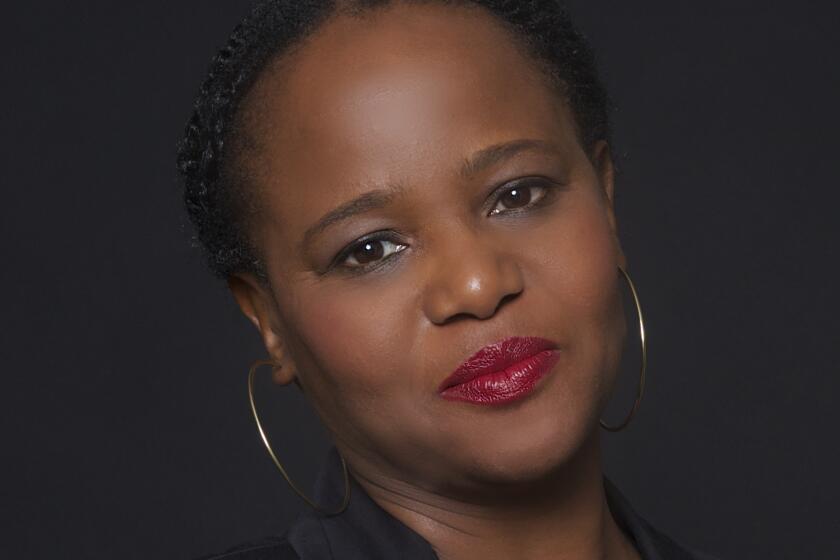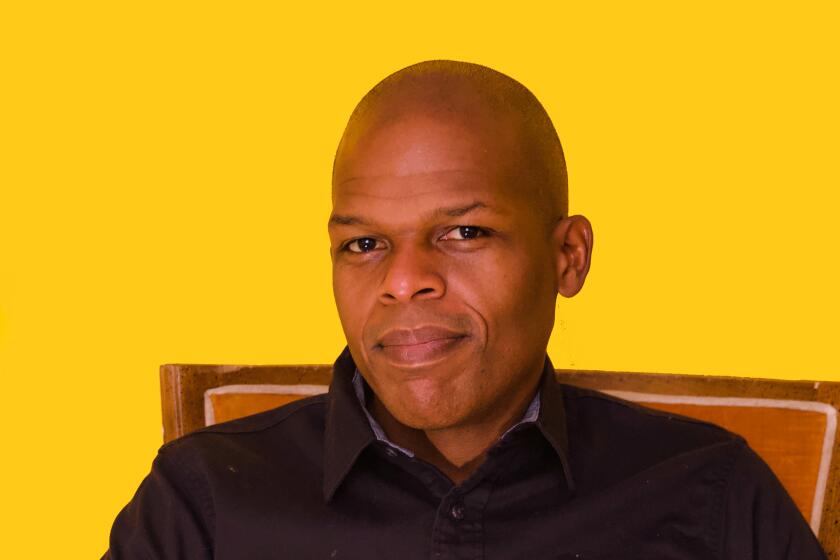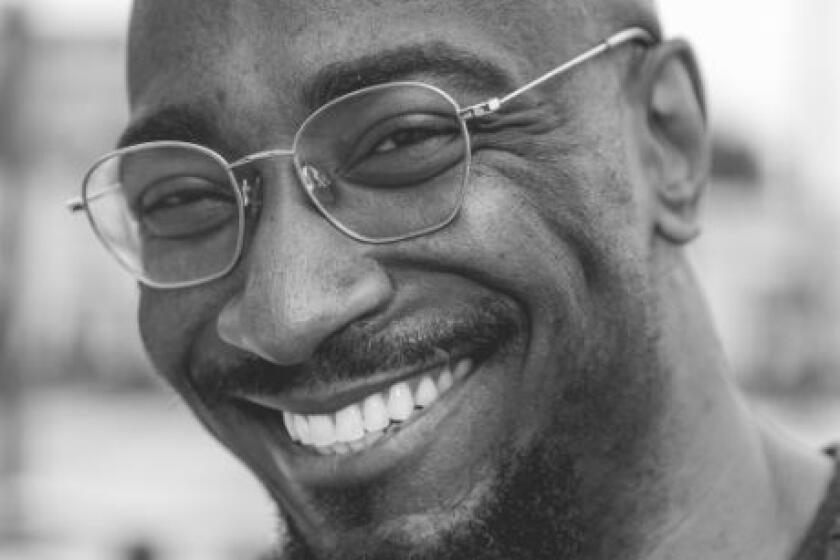On a metaphorical ‘slaveroad,’ the pain and the growth are quite real

- Share via
Book review
Slaveroad
By John Edgar Wideman
Scribner: 224 pages, $28.99
If you buy books linked on our site, The Times may earn a commission from Bookshop.org, whose fees support independent bookstores.
What role can words play to mitigate the damage of a violent history? This question is at the heart of John Edgar Wideman’s “Slaveroad,” a searing rumination on what plagues and fascinates the acclaimed 83-year-old author as he confronts his own mortality and the familial tragedies that have long centered his literary work.

Just as Wideman’s novels and other writings often eschew punctuation, fracture grammar, employ purposeful word repetitions and are less interested in linear stories than in how their telling shapes our view of the world, “Slaveroad” also defies categorization. It’s neither a novel nor a memoir nor an essay collection, though elements of all those forms are present. It reads as an agonized howl, a lament, an audacious quest to “revisit and reify moments in my life that haunt and form me.” Two such events are the 44-year incarceration of his brother Robby, for second-degree murder, and the conviction of Wideman’s son, Jacob, at age 16, for the 1986 murder of his campmate, a crime for which he is serving a life sentence.
Like other strong essay collections, ‘We’re Alone’ presents a compressed reading experience, often requiring the author to demonstrate forming an opinion.
Wideman coined the term “slaveroad” (what he refers to as a poetic “kenning,” or figurative compound word) to describe the route of the Middle Passage, the expanse of ocean “consisting of body after African body … one after another, laid head to foot, foot to head.” For him that slaveroad is a kind of living memorial — a visual metaphor for what enslaved people suffered and what their descendants still carry with them.
As he’s done in previous books, Wideman — a PEN/Faulkner Prize winner and recipient of a MacArthur “genius” grant — revives largely forgotten historical figures to keep their stories alive. William Henry Sheppard was a Black American missionary who followed “in reverse” the path of the Atlantic slave trade, traveling to Congo in 1899. This, Wideman notes, was around the same time Joseph Conrad visited that territory, about which he later wrote “Heart of Darkness.” Wideman is in conversation with Sheppard, as if the two are friends around a dinner table, discussing how the Presbyterian minister interacted with the Congolese people, how Sheppard became known as the “Black Livingstone” for venturing into parts of the Congo few Westerners had visited.
In “Someone Like Us,” his first novel in a decade, Dinaw Mengestu strives to reveal the instability that follows exiles, emigres and refugees without falsely promising an easy resolution.
Also at that table is Rebecca Protten, a formerly enslaved woman born in Antigua in 1718. She became an evangelist and educator in West Africa and is remembered as “the mother of modern missions.” Wideman seems to want to glean from these and other heroic figures how they found courage and hope despite all they endured.
Wideman is not a straightforward writer. In the midst of exchanges with Sheppard and Protten, he will suddenly grow introspective, as if jotting down journal entries. He reflects, for example, on a nearly fatal fall he took while navigating the cliffs near his part-time home in France; on a failed attempt, at age 81, to begin jogging again; that: “I still look more than okay on the beach in swim trunks, if one forgets about flab creases around my biceps, the soft, million-wrinkled slack skin creeping out from where it sleeps beneath my armpits.” There is humor and chagrin throughout, mainly at the author’s expense.
The writer’s ambitious approach to the historical novel uses techniques reminiscent of “The Handmaid’s Tale” to examine the shifting meaning of freedom.
Wideman was born in an impoverished and crime-ridden area of Pittsburgh but was an outstanding student and basketball player who went on to attend the University of Pennsylvania and then Oxford as a Rhodes scholar. That tension — between the privilege he gained and the family he left behind — is a dynamic that courses through his entire oeuvre.
Loneliness is a familiar condition to this author. He lives in New York City but writes of it: “A person can’t belong here because no one belongs here.” When unable to find the words to comfort his son when his mother is dying, Wideman writes: “Each of us alone in vast silence beyond words. Beyond any language anyone speaks.” There is a grandeur to his desolation, which is tinted with a simmering rage.
Are utopias becoming a trend in fiction during this dystopian era? The debut novel from Phillip B. Williams, ‘Ours,’ embraces magic without ignoring reality.
Wideman continually experiments with form and style, which challenges the reader to go along for what can often be a bumpy ride without a clear destination. At various points in this slim volume, Wideman questions whether he’s wasting the reader’s time, or even if writing matters at all. Despite these persistent doubts, though, he observes that if we take “the stories that belong to us … if we share them with each other, with the world, no one can unsay them.”
Strains of James Joyce, William Faulkner and James Baldwin can be discerned here — as in all of Wideman’s work. This author revels in the shattering and the reconfiguring of language, in tinkering with the English lexicon, bending it to his authorial will. He’s not going gently into any good night. He even spars with the concept of an author’s afterword, though he does include one. In it, he shakes his fist at the very thing he is writing, proclaiming: “There is no afterword. Nothing more to say. Nothing there. Nothing here. But to please myself, and perhaps for the sake of art, the sake of a nostalgic belief that writing can render those illusions of balance, symmetry, order, beauty, freedom that art attempts, I will add an author’s afterword here.”
Which he does, entirely on his own terms.
Leigh Haber is a writer, editor and publishing strategist. She was director of Oprah’s Book Club and books editor for O, the Oprah Magazine.
More to Read
A cure for the common opinion
Get thought-provoking perspectives with our weekly newsletter.
You may occasionally receive promotional content from the Los Angeles Times.













